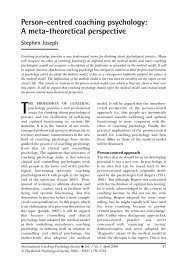Values, Virtues, and John Paul II - the St. Paul Center for Biblical ...
Values, Virtues, and John Paul II - the St. Paul Center for Biblical ...
Values, Virtues, and John Paul II - the St. Paul Center for Biblical ...
Create successful ePaper yourself
Turn your PDF publications into a flip-book with our unique Google optimized e-Paper software.
Pope is unabashedly "countercultural" when faithfulness to Christ requires it, but he doesnot look <strong>for</strong> confrontation as a matter of course. In Baltimore on October 8, 1995, Pope<strong>John</strong> <strong>Paul</strong> touched on this point in his homily: "Sometimes, witnessing to Christ willmean drawing out of a culture <strong>the</strong> full meaning of its noblest intentions, a fullness that isrevealed in Christ. At o<strong>the</strong>r times, witnessing to Christ means challenging that culture,especially when <strong>the</strong> truth about <strong>the</strong> human person is under assault."<strong>John</strong> <strong>Paul</strong>'s approach does not compromise with "modernity," but is ra<strong>the</strong>r a modern yetunapologetic expression of <strong>the</strong> perennial teachings of <strong>the</strong> Church. James Hitchcock of <strong>St</strong>.Louis University writes, "The Pope has . . . committed <strong>the</strong> Church to a relationship withculture which is both modern <strong>and</strong> traditional in <strong>the</strong> best sense of each term." All thismeans, naturally, that our secular society finds <strong>John</strong> <strong>Paul</strong> disconcerting. It keeps runninginto walls in its attempt to make him fit into preestablished molds. The same difficulty isno doubt experienced by those Catholics accustomed to conceiving <strong>the</strong> Church <strong>and</strong> herministers in terms of political categories: left, right, <strong>and</strong> center.Debate on just how far to go in her dialogue with <strong>the</strong> world has been present in <strong>the</strong>Church since her foundation. Though of far smaller scale <strong>and</strong> import, <strong>the</strong> war on "values"is reminiscent of <strong>the</strong> heated dispute between <strong>the</strong> great apologists during <strong>the</strong> first centuriesover Greek "inculturation." Some, such as Tertullian, Tatian, <strong>and</strong> Arnobius, werepassionately opposed to Greek philosophy <strong>and</strong> culture in <strong>the</strong> fear that <strong>the</strong>ir influencewould adulterate <strong>the</strong> gospel. O<strong>the</strong>rs, however, such as Justin Martyr <strong>and</strong> Clement ofAlex<strong>and</strong>ria, endeavored to articulate <strong>the</strong> message of <strong>the</strong> gospel using Hellenisticterminology <strong>and</strong> philosophical concepts. By so doing <strong>the</strong>y sought to facilitate <strong>the</strong> Greeks'acceptance <strong>and</strong> assimilation of Christianity, <strong>and</strong> <strong>the</strong> spread of Christianity itself.Fortunately Justin <strong>and</strong> Clement won out in <strong>the</strong> controversy, <strong>and</strong> <strong>the</strong> "baptism" of Greekphilosophy enriched both philosophy <strong>and</strong> Christian expression as well. Similar disputescontinue up to <strong>the</strong> present day. During <strong>the</strong> Second Vatican Council, <strong>for</strong> example, <strong>the</strong>rewas resistence to using <strong>the</strong> word "dignity" in <strong>the</strong> conciliar document on religious liberty,on <strong>the</strong> grounds that it smacked of secular humanism.Time <strong>and</strong> time again Pope <strong>John</strong> <strong>Paul</strong> <strong>II</strong> has demonstrated his evangelical prudence. In hisdialogue with <strong>the</strong> modern world he has maintained a careful balance between firmness<strong>and</strong> flexibility. His advancement of values-toge<strong>the</strong>r with virtues-is in keeping with hislarger program: <strong>the</strong> promotion of <strong>the</strong> integral good of <strong>the</strong> human person, culminating insalvation through <strong>the</strong> gospel."Democracy st<strong>and</strong>s or falls with <strong>the</strong> truths <strong>and</strong> values which it embodies <strong>and</strong> promotes."These words <strong>for</strong>med <strong>the</strong> core of <strong>John</strong> <strong>Paul</strong>'s address given at <strong>the</strong> farewell ceremony ofOctober 8, 1995, which officially closed his visit to <strong>the</strong> United <strong>St</strong>ates. The Pope added,"But <strong>the</strong>se values <strong>the</strong>mselves must have an objective content. O<strong>the</strong>rwise <strong>the</strong>y correspondonly to <strong>the</strong> power of <strong>the</strong> majority, or <strong>the</strong> wishes of <strong>the</strong> most vocal." We ought to insist onthis vital link between values <strong>and</strong> objective content. It is time to end <strong>the</strong> war on values,not by laying down our arms or ab<strong>and</strong>oning <strong>the</strong> battlefield, but ra<strong>the</strong>r by fearlesslyproclaiming <strong>and</strong> living out <strong>the</strong> truth.



